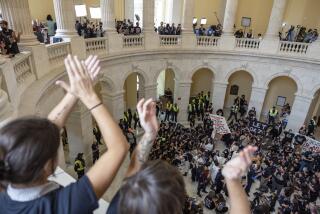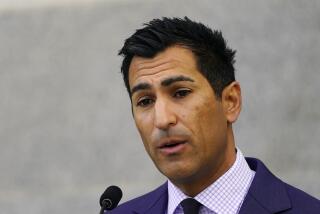Chaotic Iraq Assembly Closes Doors to the Media
BAGHDAD â Iraqâs new National Assembly was only 10 minutes into its second session Tuesday when members became mired in a shouting match that caused leaders to close the gathering to the media. The meeting broke up after an hour with no progress toward forming a government.
After offering Iraqis a rare glimpse of open debate in a legislative body they had elected, lawmakers ordered the media to turn off their cameras. Local television stations began to play music instead of broadcasting the breaking news -- much as they had done on government orders during Saddam Husseinâs time, onlookers noted.
The disarray is the result of a hardball struggle between individual politicians as well as political blocs over how to share power. Though many policy differences between the factions have been resolved, undecided are the vice presidentsâ and deputy prime ministersâ seats and the distribution of the ministries.
âThe problem is that so far there are no mutual understandings among the principal political blocs,â said Abdul Karim Mohammedawi, a Shiite Muslim from the assemblyâs largest bloc, the United Iraqi Alliance, who is known for his independent views.
Although several prominent members said they expected the transitional assembly to convene Sunday and name a speaker and two vice speakers after Sunni Muslims have had a chance to decide on a candidate for the speakership, the formation of a government is still probably weeks away.
The political turmoil has worsened in the weeks since Iraqâs historic elections Jan. 30, as the heady excitement over the balloting has faded and the negotiations have become increasingly hard-fought.
Complicating matters is the fact that the two largest blocs in the assembly -- the Shiite-dominated United Iraqi Alliance and the ethnic Kurds -- are trying to draw Sunni Arabs into the government, in part by offering them the speakerâs post.
Iraqâs Sunni voters largely boycotted the elections, and as a consequence it is difficult to determine who among the few Sunni assembly members has support in their broader community.
âWhy would they call for a meeting of the National Assembly if they had not reached any compromises or joint agreements about mechanisms or about the persons who are going to be at the top of the National Assembly?â asked Mohammedawi, echoing the frustration voiced by many Iraqis on the streets.
The assembly is responsible for selecting the countryâs interim president and two vice presidents. That presidential council will choose a prime minister, who in turn will name a Cabinet and form the government. The assembly also is expected to write a national constitution.
Tuesdayâs disorder followed an announcement by Ghazi Ajil Yawer, president in the interim national government, which the assembly is seeking to replace, that he would turn down the position of assembly speaker.
His announcement, made to the media Monday night, caught the assembly leadership off guard. The position then was offered to another prominent Sunni Arab member of the legislature, interim Minister of Industry Hachim Hassani. He turned it down as well, saying that without a major political bloc -- his party has just five of the 275 seats in the assembly -- he would be little more than a figurehead.
Hassani also hopes to be named defense minister, a post the United Iraqi Alliance has said could go to a Sunni.
Now the 17 Sunnis in the assembly are going back to the drawing board to find a candidate for speaker.
It will not be easy. Other than Yawer and Hassani, few of the Sunni members are well-known. In addition, several were elected as part of the Shiitesâ United Iraqi Alliance -- and thus are unlikely to be accepted by most Sunnis.
A new source of uncertainty is that after weeks of negotiations between the Kurds and the United Iraqi Alliance, the former have begun to negotiate with interim Prime Minister Iyad Allawiâs smaller party.
Allawiâs bloc, like the Kurdish faction, is largely secular. The Kurds apparently are seeking to create a counterweight in a possible government dominated by religious Shiites.
However, Barham Salih, the deputy prime minister of the current interim government, said he and his fellow Kurds were merely intent on ensuring that everyone was part of the government.
âWe are talking with Allawiâs party ... and we are trying to make a national unity government,â he said. âThe Kurds are serious about that. Iraq was ruled by a tiny minority to the exclusion of the Shiites and Kurds, who paid dearly for that.â
After the election, members of Allawiâs Iraqi List bloc appeared reluctant to take an active role unless he was allowed to continue on as prime minister -- an unlikely outcome since the party won comparatively few seats. Now they seem ready to take part and in a mood to bargain.
Falah Nakib, interior minister in the current government and a member of the Iraqi List, noted to reporters that a ministry was being granted to parties or blocs for every 10 seats in the assembly. By that rationale, he said, âwe should have four ministries since we have 40 seats.â
Shortly after Nakibâs comments, Allawi stalked out of the National Assembly session, followed by Yawer.
The session opened with a call to elect a speaker, but a veiled member rose and berated the assemblyâs leaders for conducting their business behind closed doors where few members of the assembly, much less the Iraqi people, know what is going on.
âWe and the Iraqi people want to know what is going on behind the curtains and in the corridors,â she said. âI demand now that all details should be revealed to the other assembly members and the Iraqi people so that everybody knows what is slowing up the political process.â
A member of Allawiâs bloc, Shiite cleric Hussein Sadr, faulted the assembly for dragging its feet.
âWe canât do our job as members of the National Assembly unless we elect a speaker and his deputies ... so that we can start our central task, which is to write the constitution,â he said.
âThe people are waiting for us to get to work,â he said, his voice rising.
People began to shout to be heard. A moment later, Dhari Fayad, the oldest member of the assembly and for now its ceremonial speaker, closed the proceedings to the public.
âWe ask the media to leave,â he said, âso that we can hold the meeting behind closed doors so that we can discuss our affairs.â
In less than an hour, the meeting adjourned.
More to Read
Sign up for Essential California
The most important California stories and recommendations in your inbox every morning.
You may occasionally receive promotional content from the Los Angeles Times.










